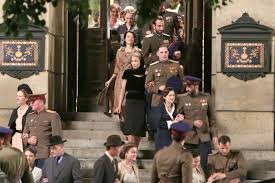CRIME DOES PAY: Movie Reviews of Logan Lucky and The Nile Hilton Incident by Howard Casner
Posted: September 19, 2017 | Author: Donald | Filed under: Uncategorized | Tags: Adam Driver, Channing Tatum, Daniel Craig, Fares Fares, Hillary Swank, Logan Lucky, Rebecca Blunt, Steven Soderbergh, Tarik Saleh, The Nile Hilton Incident | 1,462 Comments » For questions: hcasner@aol.com
For questions: hcasner@aol.com
First, a word from our sponsors: I am now offering a new service: so much emphasis has been given lately to the importance of the opening of your screenplay, I now offer coverage for the first twenty pages at the cost of $20.00. For those who don’t want to have full coverage on their screenplay at this time, but want to know how well their script is working with the opening pages, this is perfect for you. I’ll help you not lose the reader on page one.
Ever wonder what a reader for a contest or agency thinks when he reads your screenplay? Check out my new e-book published on Amazon: Rantings and Ravings of a Screenplay Reader, including my series of essays, What I Learned Reading for Contests This Year, and my film reviews of 2013. Only $2.99. http://ow.ly/xN31r
and check out my Script Consultation Services: http://ow.ly/HPxKE
Warning: SPOILERS
 Everyone in the US seems to agree that the working class is under siege. And it’s still unclear whether there is any real relief in sight.
Everyone in the US seems to agree that the working class is under siege. And it’s still unclear whether there is any real relief in sight.
I’m not sure whether this is the reason filmmakers have been creating stories that focus on the more downtrodden in our society (zeitgeists are almost impossible to recognize until we are out of them), but last year we had Hell or High Water, and more recently we’ve had Patti Cake$, Beach Rats and the topic of this review, Logan Lucky.
All the films have fallen into various genres and niches. Hell or High Water is a modern western/crime film; Patti Cake$ is a musical; Beach Rats is a coming out story; and Logan Lucky is a heist film.
All have, as their central characters, people struggling just to make ends meet or who are lost in a world that seems to have no future for them.
IT’S NOT THE SIZE, IT’S WHAT YOU DO WITH IT: Movie reviews of Child 44 and Unfriended by Howard Casner
Posted: April 20, 2015 | Author: Donald | Filed under: Uncategorized | Tags: Child 44, Daniel Espinoza, Fares Fares, Gary Oldman, Jacob Wysocki, Jason Clarke, Joel Kinnamen, Levan Gabriadze, Nelson Greaves, Noomi Rapace, Paddy Considine, Richard Price, Tom Hardy, Tom Rob Smith, Vincent Cassel | 216 Comments »First, a word from our sponsors. Ever wonder what a reader for a contest or agency thinks when he reads your screenplay? Check out my new e-book published on Amazon: Rantings and Ravings of a Screenplay Reader, including my series of essays, What I Learned Reading for Contests This Year, and my film reviews of 2013. Only $2.99. http://ow.ly/xN31r
and check out my Script Consultation Services: http://ow.ly/HPxKE
Warning: SPOILERS
 Child 44, the new mystery thriller that is about the hunt for a serial killer in post-World War II Soviet Union, has received terrible reviews. I mean, horrendous in some cases. It’s at 25% at rottentomatoes. And very few, so far, have had much too good to say about it.
Child 44, the new mystery thriller that is about the hunt for a serial killer in post-World War II Soviet Union, has received terrible reviews. I mean, horrendous in some cases. It’s at 25% at rottentomatoes. And very few, so far, have had much too good to say about it.
Well, I’m here to suggest that maybe the movie is being a bit maligned.
That is not to say I think it’s great. I definitely do not believe it quite succeeds on its own terms or rises above what it is.
And it’s also possible that I went in expecting the worst, only to be pleasantly surprised. That’s certainly happened to all of us at one time or another.
But still, I think there is much to like here, especially if you are a fan of neo-noir or crime dramas. Read the rest of this entry »
Movie Review of ZERO DARK THIRTY by Howard Casner
Posted: December 26, 2012 | Author: Donald | Filed under: Uncategorized | Tags: Edgar Ramirez, Fares Fares, Jason Clarke, Jennifer Ehle, Jessica Chastain, Kathryn Bigelow, Mark Boal, Mark Duplass, Zero Dark Thirty | 642 Comments »There are some movies, we all have been there/done that, that are praised to high heaven by the critics and rapturously spoken about by fellow movie goers, but somehow leave you cold. I’m afraid to say that this is how I felt about Zero Dark Thirty, writer Mark Boal and director Kathryn Bigelow’s new film about the search for Osama Ben Laden. I really don’t get it. I really don’t understand why everyone likes this movie as much as they do.
The movie centers around the character of Maya, a government operative who is obsessive in her hunt for the man responsible for 9/11. And this is probably where the movie either works for you or doesn’t. But for me, Maya is one of the least interesting characters I have come across in a major movie in some time. She has no personality that I could tell, unless you consider bland and boring to be a personality; well, I guess it is, but I don’t think it’s a particularly dramatic one that can carry a movie. And Jessica Chastain, who is one of the flavors of the month (ten points for anyone who can remember when that phrase was the phrase de jeur—or flavor of the month), doesn’t seem to have that necessary quality, that imperceptible something, to give the character what the writer didn’t in the way that actors like Katherine Hepburn, Bette Davis and even Joan Crawford could.
Maya is part cliché, part superhero, part saint. She’s that character you’ve seen in dozens of films, the only one with the truth, the voice crying in the wilderness, who has to fight tooth and nail against the non-believers in order to make everyone else see the light. She has some of the most ludicrous exchanges with her higher ups, especially one where she blackmails her boss, Joseph Bradley (Kyle Chandler repeating his bureaucrat Babbit role from Argo—at least he has an excuse for having no personality, it’s in his job description), into giving her support to follow one of her hunches (she does this by telling him that if he doesn’t, she’ll tell the government how he stopped her from going after Ben Laden—how I wanted him to tell her to go ahead, that if it didn’t hurt Bush’s chances for reelection, there’s no way it will cause him any problems). The only scene that was even more uncomfortable to watch is the dressing down Mark Strong, as May’s boss in D.C., gives his minions—when he slapped his hand on the table, I had a very difficult time not giggling. Perhaps the oddest moments here are when a character describes Maya and Chastain’s performance is totally at odds with the description (at one point she’s called at killer—yeah, right; and at other times, she’s described as worn and needing time off—all I could think is that I wish I looked so good for being so worn.)
Her character arc is structured like a Spiderman/Superman/Batman movie. The first third is the origin story in which Maya gets bitten by a radioactive spider (here the Ben Laden bug) and vows revenge against the bad guys when her Uncle is killed by the bad guys in which she feels some sort of guilt (here, it’s the death of her co-worker). The next section is the various evil deeds the super villain commits that no one can seem to stop. And the final section is the super hero taking out the super villain. Of course, this also shows part of the problem with the film. First, there is no proof that the super villain is responsible for any of the evil done in the central section (people try to tell her that Ben Laden is no longer in charge of Al Qaeda, but she won’t listen). And in the final section, she can’t actually participate in the final climactic fight. So, in retrospect, I’m not convinced that this was the best structure to go for.
But finally Maya is also portrayed as Joan of Arc. She is on a mission from God (at one point, she says she believes she was spared dying in a terrorist attack to bring Ben Laden to justice); she is the only one God is talking to; she has to convince the Dauphin (played here by James Gandolfini) to let her head the troops into battle; and when she does, the troops (led by Joel Edgerton’s Patrick) only have faith in the mission because she has faith in the mission. All that’s missing is a burning stake at the end.
However, in its favor, the movie does surround Maya with a strong supporting cast that does bring that something more to their roles. The best performance is probably given by Jason Clarke as Dan, the torturer who is starting to realize he may be going down a dark hole he may not be able to find his way back from (he also gave the best performance in the moonshine drama Lawless). Other actors also make their mark in even smaller roles: Safe House’s Fares Fares; Edgar Ramirez (who played Carlos in the amazing Olivier Assayas series); mumblecore’s Mark Duplass; and Contagion’s Jennifer Ehle (she of the impossible high check bones)…in fact, almost anybody other than Chastain.
The most impressive moments in the script are not the interactions between the characters (which always feel a bit flat), but the moments that Bigelow excels in, scenes of high tension that often result in devastating violence (and even though you know that the scene is going to end in an explosion, that only makes the scene more nerve wracking). And, of course, there’s the final tour de force of the assault on Ben Laden’s compound. It’s in these scenes that one can see what the movie could have been. But when there’s a vacuum at the core of the movie, as if feels like there is here with the role of Maya, it’s a little hard to make the movie work as a whole.
I can’t conclude a review of this movie without talking about the most controversial aspect of the film and that is the use of torture. From my perspective, this is how torture is portrayed by Boal and Bigelow. The first third of the movie is a series of scenes in which people are tortured or people are shown who have been tortured. The torture is not posited here as something that had to happen, but as something that did happen. In fact, at the end of this section, everyone realizes that all this torture has done nothing to stop Al Qaeda because the explosions and attacks just keep on coming. The only thing the operatives get from the torture is a name that eventually leads them to Ben Laden’s compound. But by that time, Ben Laden is a paper tiger, someone who needs desperately to be killed for symbolic reasons, but not for practical ones. So, the movie basically says (though I’m not sure it realizes fully that this is its message), that all this money, time and effort spent on dehumanizing not just their fellow man, but the torturers themselves, did nothing to stop Al Qaeda, but did help the U.S. stop someone before he…well, did nothing, because Ben Laden was no longer doing anything. And the question one has to ask oneself is whether all that torture was worth it if that was its only result. I’ll leave that to you.











